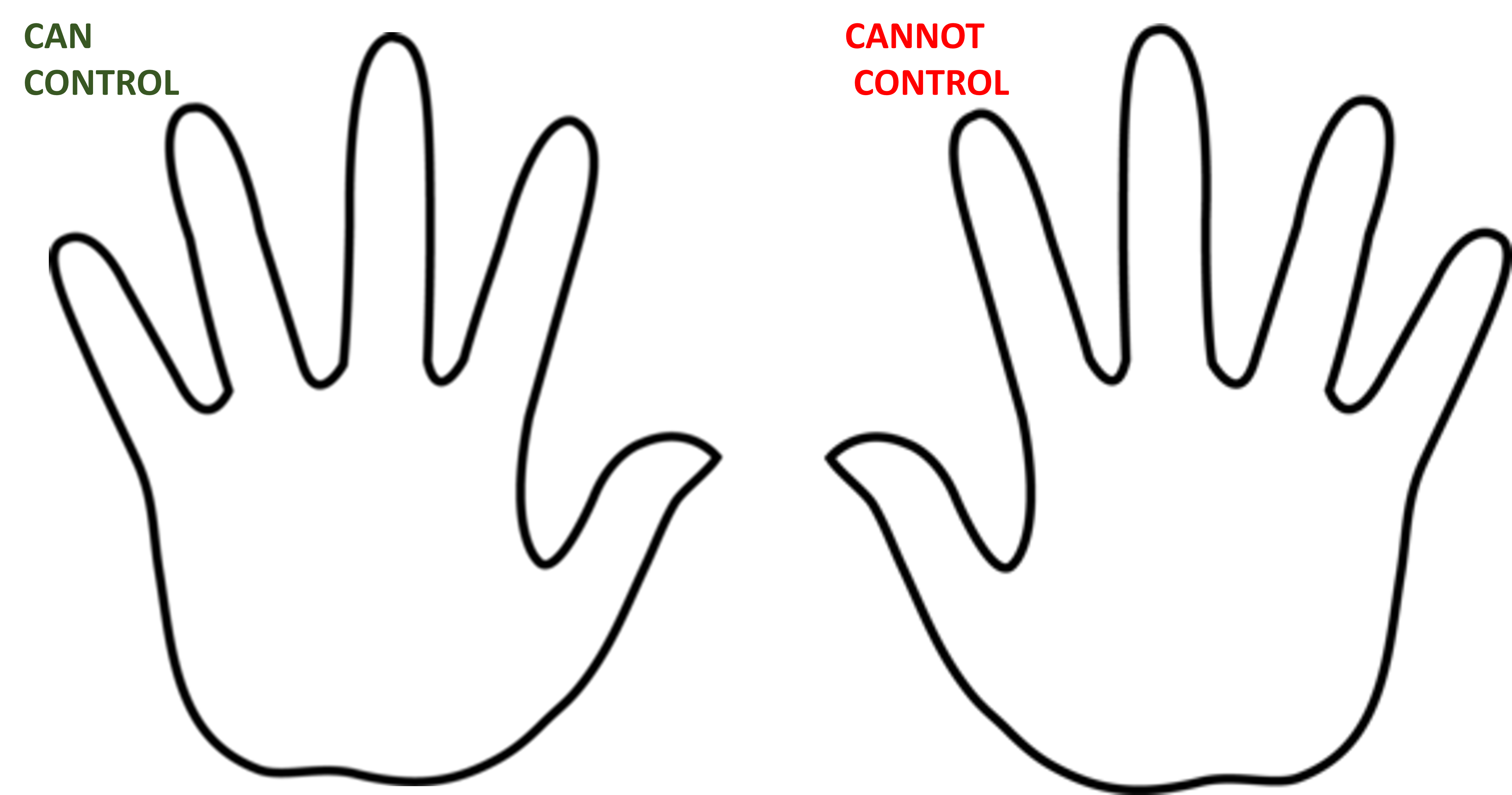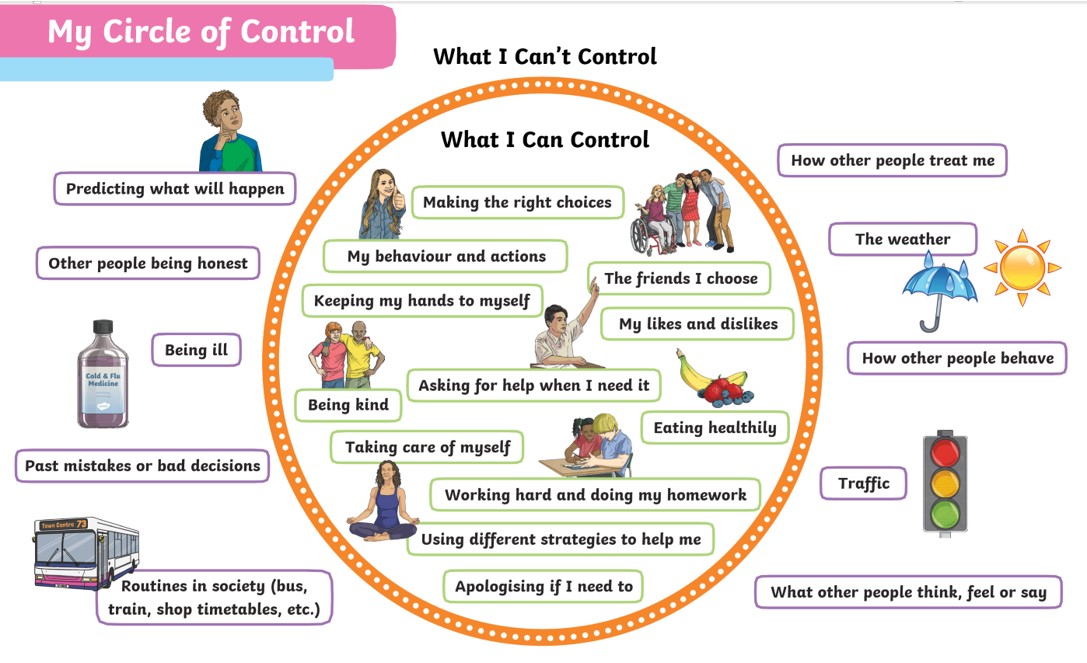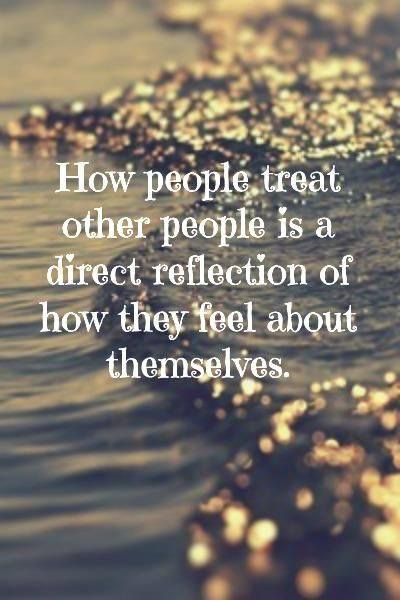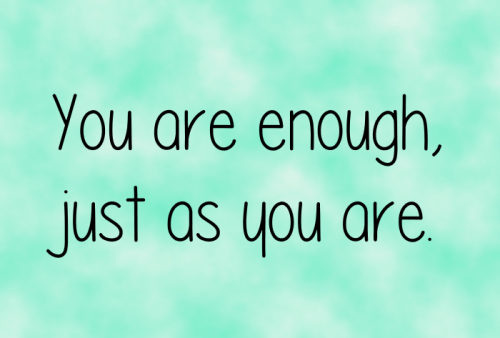2 HANDS: THINGS WE CAN AND CANNOT CONTROL
One of my favourite exercises and something I implement frequently is the two hands and two choices practice. There are things we can control and things we can’t. It’s as simple as that.
 2 hands: 2 choices
2 hands: 2 choices
2 hands.
2 choices.
2 options.
Things we can control and things we can’t control.
We cannot control the actions of others (first hand) but we CAN control how we react to that (second hand).
5 reasons why
For example, if we text someone but it remains unread or we don’t receive a reply, instead of feeling sad about this, we could hold our hands up and remind ourselves of our two options. We can control how we REACT to this.
Then, we can look at our 5 fingers and think of 5 reasons why they may not have responded, such as:
1. They were out for the day/busy with work
2. They wanted to give themselves time to craft a proper response
3. Their phone pinged with so many messages they haven’t even seen it yet
4. They are overwhelmed with work/life and too tired to respond
5. They simply forgot (haven’t we all done this occasionally?)
 It’s not about you
It’s not about you
None of these are about you. They are all about the other person.
Stop making up stories about what you think other people think about you or act towards you, I promise they are not true! That’s just our thoughts being mean and playing tricks on us. It’s up to us to say STOP or SHHH and turn the volume down. Holding your two hands up in front of you, taking a physical step back and letting out a big whoosh of an exhale can be a great way to create a moment for yourself to gain perspective and reframe.
 Have a look at the Circle of Control image as a reminder of things we can and cannot influence, such a great visual (no idea where it came from, although happy to credit).
Have a look at the Circle of Control image as a reminder of things we can and cannot influence, such a great visual (no idea where it came from, although happy to credit).
The main ones:
- What other people think, feel or say
- How other people treat me
- How other people behave
are NOT in my control.
Comparison
If we have heard people say “I wish you were more like xxx” then wouldn’t it be wonderful if we could act shocked that they would even say that out loud, rather than shrink away and worry that there is something wrong with us, or think we should change ourselves somehow.
We’ve all probably heard a that passive aggressive comment in our times. For example, being told “you’re so loud” – excuse me? Loud to whom? Am I too loud for me? Nope, absolutely fine over here! If you think I’m too loud, what does that even mean??
NOT IN OUR CONTROL What people say or think about you
IN OUR CONTROL How we respond to that and whether we let ourselves believe it. Whether we give a flying monkey about what they think in the first place anyway. Don’t take criticism from someone you wouldn’t go to for advice.
It’s about them
Reminding ourselves that just because they might have a problem with you does NOT mean there IS a problem with you. That’s on them. Not on you. Let it go. Or if that feels like a step too far, look for reasons and evidence about how they are wrong.
If you’re told you’re loud, reframe it as being someone who has the courage to speak their mind. Someone who speaks up for their friends. Someone who is awesome at holding boundaries. Someone who is happy in their own skin and knows they are enough just as they are thank you very much).
Rewind
You know how after the moment you realise you have the best come-back line and want to go back in time/call that person up and share it?! Imagine if you could also create a different ending by reframing it with more of a “how very dare you!” attitude. How dare anyone say you are not enough. Wouldn’t it be wonderful if our default position become one of incredulity that someone would have the audacity to criticise or put someone else down, rather than wanting to curl up or shrink ourselves to fit into a box they put us in. Shoulders back, deep breath and claim your space.
You are absolutely enough and simply awesome just as you are.

Radiators and drainers
Ask yourself: why do you want to like everybody if you don’t like everyone and everything?? How is that possible?
What others say about you is a reflection on them. There are radiators and drainers in life. Be someone who radiates: happiness, warmth and support, rather than be someone who is a drain: speaking negatively about someone, tearing them down and spreading misery.
If you find yourself doing this, ask yourself: is this actually about me?
Am I feeling envious right now because so-and-so is happy/confident/exercising/smashing life and I am currently feeling a little down and little stuck?
If so, be kind to yourself. Have compassion. Your thoughts may have gotten a little confused. You might currently feeling a bit down about yourself and it’s easier to tell yourself that someone else is too something, when actually you may be wanting to feel that way yourself.
Reframing thoughts
How would we feel if we could reframe that into: how could I be happier?
What is it about that person’s happiness that is triggering me?
Their job, their relationship, their physical appearance?
Am I feeling fulfilled in my career? Am I feeling happy and secure in my relationship? Am I moving regularly, getting enough sleep or fuelling my body well (most of the time, let’s be human and admit we all like cake!).
Inner critic and self belief
So please, if you are left with an inner critic bringing you down all the time, take a moment to pause and listen. What is it saying? And what is I truly? What does it mean?
I struggle with self belief sometimes even though I do all this personal development work. Why? Because I’m a human. However, I am fortunate that I have an entire toolkit of techniques to help me get out of my head and reframe things.
When I notice my thoughts going down a path of “I can’t do that. No-one will want to buy that offer from me. Who am I to try that?” I take time out and look for the evidence of where I have done things before and they have gone well. I look for where I have tried new strategies in business (such as workshops in person or online) and I look back over the positive responses and testimonials I received and remind myself how it helped people. Finding the evidence, doing the tapping (Emotional Freedom Technique) and finding an affirmation to help (“I am enough, just as I am”) are all ways I can recalibrate and feel stronger again.

I hope this helps you start to realise you are enough, just as you are.
If you want to know more about reframing thoughts or changing negative thoughts patterns, just get in touch and we can chat further.
Love Sarah x

